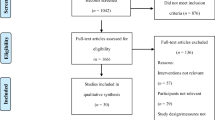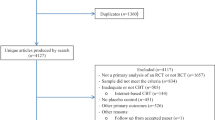Abstract
Background
Insomnia is a well-recognized co-morbid condition in veterans with post-traumatic stress disorder (PTSD) with negative personal and social consequences. Cognitive behavioral therapy (CBT) is considered an efficacious treatment, yet little attention has been devoted to treatment response in this population. The aim of this study was to identify factors that may predict clinical response to CBT for insomnia (CBT-I) in veterans with PTSD.
Methods
A retrospective chart review of 136 veterans with PTSD-related insomnia was conducted. Epworth Sleepiness Score (ESS), PTSD Checklist (PCL), and Insomnia Severity Index (ISI) were assessed at baseline. We converted prescribed antidepressant and hypnotic dosages before and after CBT-I to dose equivalent of fluoxetine diazepam, respectively. A 6-point reduction or greater in ISI scores at 6-month follow-up visit was defined as CBT-I responsiveness.
Results
CBT-I responsiveness was observed in 47% of veterans with PTSD. Seventy-seven percent completed treatment. Lack of perceived benefit was the most given reason for failure to return for follow-up. In contrast to hypnotics, antidepressants usage decreased in those who had experienced benefit from CBT-I (p = 0.001). Younger age, non-white race, and use of hypnotics prior to behavioral therapy were independently associated with lack of response to CBT-I.
Conclusions
While CBT-I ameliorates insomnia in veterans with PTSD, the use of hypnotics prior to instituting behavioral therapy may negatively affect the response rate to CBT-I. Future studies should examine whether racial and cultural influences on the generation of insomnia in veterans with PTSD affects the response to CBT-I.



Similar content being viewed by others
References
Baird T, McLeay S, Harvey W, Theal R, Law D, O'Sullivan R, Initiative P (2018) Sleep disturbances in Australian Vietnam veterans with and without posttraumatic stress disorder. J Clin Sleep Med 14(5):745–752. https://doi.org/10.5664/jcsm.7096
Maher MJ, Rego SA, Asnis GM (2006) Sleep disturbances in patients with post-traumatic stress disorder: epidemiology, impact and approaches to management. CNS drugs 20(7):567–590. https://doi.org/10.2165/00023210-200620070-00003
Amin MM, Parisi JA, Gold MS, Gold AR (2010) War-related illness symptoms among operation Iraqi freedom/operation enduring freedom returnees. Mil Med 175(3):155–157
Seelig AD, Jacobson IG, Smith B, Hooper TI, Boyko EJ, Gackstetter GD, Gehrman P, Macera CA, Smith TC, Millennium Cohort Study T (2010) Sleep patterns before, during, and after deployment to Iraq and Afghanistan. Sleep 33(12):1615–1622
Hughes JM, Ulmer CS, Gierisch JM, Nicole Hastings S, Howard MO (2018) Insomnia in United States military veterans: an integrated theoretical model. Clin Psychol Rev 59:118–125. https://doi.org/10.1016/j.cpr.2017.11.005
Applewhite L, Keller N, Borah A (2012) Mental health care use by soldiers conducting counterinsurgency operations. Mil Med 177(5):501–506
Wright KM, Britt TW, Bliese PD, Adler AB, Picchioni D, Moore D (2011) Insomnia as predictor versus outcome of PTSD and depression among Iraq combat veterans. J Clin Psychol 67(12):1240–1258. https://doi.org/10.1002/jclp.20845
McLay RN, Klam WP, Volkert SL (2010) Insomnia is the most commonly reported symptom and predicts other symptoms of post-traumatic stress disorder in U.S. service members returning from military deployments. Mil Med 175(10):759–762
Hoge EA, Austin ED, Pollack MH (2007) Resilience: research evidence and conceptual considerations for posttraumatic stress disorder. Depress Anxiety 24(2):139–152. https://doi.org/10.1002/da.20175
Qaseem A, Kansagara D, Forciea MA, Cooke M, Denberg TD, Clinical Guidelines Committee of the American College of P (2016) Management of chronic insomnia disorder in adults: a clinical practice guideline from the American College of Physicians. Ann Intern Med 165(2):125–133. https://doi.org/10.7326/M15-2175
Talbot LS, Maguen S, Metzler TJ, Schmitz M, McCaslin SE, Richards A, Perlis ML, Posner DA, Weiss B, Ruoff L, Varbel J, Neylan TC (2014) Cognitive behavioral therapy for insomnia in posttraumatic stress disorder: a randomized controlled trial. Sleep 37(2):327–341. https://doi.org/10.5665/sleep.3408
Espie CA, Inglis SJ, Harvey L (2001) Predicting clinically significant response to cognitive behavior therapy for chronic insomnia in general medical practice: analysis of outcome data at 12 months posttreatment. J Consult Clin Psychol 69(1):58–66
Troxel WM, Conrad TS, Germain A, Buysse DJ (2013) Predictors of treatment response to brief behavioral treatment of insomnia (BBTI) in older adults. J Clin Sleep Med 9(12):1281–1289. https://doi.org/10.5664/jcsm.3270
Gagne A, Morin C (2001) Predicting treatment response in older adults with insomnia. J Clin Geropsychol 7:131–143
Hayasaka Y, Purgato M, Magni LR, Ogawa Y, Takeshima N, Cipriani A, Barbui C, Leucht S, Furukawa TA (2015) Dose equivalents of antidepressants: evidence-based recommendations from randomized controlled trials. J Affect Disord 180:179–184. https://doi.org/10.1016/j.jad.2015.03.021
Lieberman JA, Tasman, A. (2006) Handbook of psychiatric drugs. John Wiley & Sons Incorporated,
Perlis M, Jungquist C, Smith M, Posner D (2005) The cognitive behavioral treatment of insomnia: a treatment manual. Springer Verlag, New York
Johns MW (1991) A new method for measuring daytime sleepiness: the Epworth sleepiness scale. Sleep 14(6):540–545
Weathers F, Litz B, Herman D, Huska J, Keane T (1993) The PTSD checklist: reliability, validity, & diagnostic utility. Paper presented at the Annual Meeting of the Internation Society of Traumatic Stress Studies, San Antonio, TX,
Bastien CH, Vallieres A, Morin CM (2001) Validation of the insomnia severity index as an outcome measure for insomnia research. Sleep Med 2(4):297–307
Pietrzak RH, Tsai J, Armour C, Mota N, Harpaz-Rotem I, Southwick SM (2015) Functional significance of a novel 7-factor model of DSM-5 PTSD symptoms: results from the National Health and resilience in veterans study. J Affect Disord 174:522–526. https://doi.org/10.1016/j.jad.2014.12.007
Armour C, Tsai J, Durham TA, Charak R, Biehn TL, Elhai JD, Pietrzak RH (2015) Dimensional structure of DSM-5 posttraumatic stress symptoms: support for a hybrid anhedonia and externalizing behaviors model. J Psychiatr Res 61:106–113. https://doi.org/10.1016/j.jpsychires.2014.10.012
Yang M, Morin CM, Schaefer K, Wallenstein GV (2009) Interpreting score differences in the insomnia severity index: using health-related outcomes to define the minimally important difference. Curr Med Res Opin 25(10):2487–2494. https://doi.org/10.1185/03007990903167415
Baraldi AN, Enders CK (2010) An introduction to modern missing data analyses. J Sch Psychol 48(1):5–37. https://doi.org/10.1016/j.jsp.2009.10.001
DeViva JC, Zayfert C, Pigeon WR, Mellman TA (2005) Treatment of residual insomnia after CBT for PTSD: case studies. J Trauma Stress 18(2):155–159. https://doi.org/10.1002/jts.20015
Petrov ME, Lichstein KL (2016) Differences in sleep between black and white adults: an update and future directions. Sleep Med 18:74–81. https://doi.org/10.1016/j.sleep.2015.01.011
Ruiter ME, DeCoster J, Jacobs L, Lichstein KL (2010) Sleep disorders in African Americans and Caucasian Americans: a meta-analysis. Behav Sleep Med 8(4):246–259. https://doi.org/10.1080/15402002.2010.509251
Ruiter ME, Decoster J, Jacobs L, Lichstein KL (2011) Normal sleep in African-Americans and Caucasian-Americans: a meta-analysis. Sleep Med 12(3):209–214. https://doi.org/10.1016/j.sleep.2010.12.010
Kohn LP, Oden T, Munoz RF, Robinson A, Leavitt D (2002) Adapted cognitive behavioral group therapy for depressed low-income African American women. Community Ment Health J 38(6):497–504
Benish SG, Quintana S, Wampold BE (2011) Culturally adapted psychotherapy and the legitimacy of myth: a direct-comparison meta-analysis. J Couns Psychol 58(3):279–289. https://doi.org/10.1037/a0023626
Lund BC, Abrams TE, Bernardy NC, Alexander B, Friedman MJ (2013) Benzodiazepine prescribing variation and clinical uncertainty in treating posttraumatic stress disorder. Psychiatr Serv 64(1):21–27. https://doi.org/10.1176/appi.ps.201100544
Lund BC, Bernardy NC, Vaughan-Sarrazin M, Alexander B, Friedman MJ (2013) Patient and facility characteristics associated with benzodiazepine prescribing for veterans with PTSD. Psychiatr Serv 64(2):149–155. https://doi.org/10.1176/appi.ps.201200267
Cates ME, Bishop MH, Davis LL, Lowe JS, Woolley TW (2004) Clonazepam for treatment of sleep disturbances associated with combat-related posttraumatic stress disorder. Ann Pharmacother 38(9):1395–1399. https://doi.org/10.1345/aph.1E043
Guina J, Rossetter SR, De RB, Nahhas RW, Welton RS (2015) Benzodiazepines for PTSD: a systematic review and meta-analysis. J Psychiatr Pract 21(4):281–303. https://doi.org/10.1097/PRA.0000000000000091
Matar MA, Zohar J, Kaplan Z, Cohen H (2009) Alprazolam treatment immediately after stress exposure interferes with the normal HPA-stress response and increases vulnerability to subsequent stress in an animal model of PTSD. Eur Neuropsychopharmacol 19(4):283–295. https://doi.org/10.1016/j.euroneuro.2008.12.004
Li S, Murakami Y, Wang M, Maeda K, Matsumoto K (2006) The effects of chronic valproate and diazepam in a mouse model of posttraumatic stress disorder. Pharmacol Biochem Behav 85(2):324–331. https://doi.org/10.1016/j.pbb.2006.08.015
Group MoP-TSW (2017) VA/DoD clinical practice guidelines for management of post-traumatic stress. Washington, DC
Rosen CS, Greenbaum MA, Schnurr PP, Holmes TH, Brennan PL, Friedman MJ (2013) Do benzodiazepines reduce the effectiveness of exposure therapy for posttraumatic stress disorder? J Clin Psychiatry 74(12):1241–1248. https://doi.org/10.4088/JCP.13m08592
van Minnen A, Arntz A, Keijsers GP (2002) Prolonged exposure in patients with chronic PTSD: predictors of treatment outcome and dropout. Behav Res Ther 40(4):439–457
Morin CM, Vallieres A, Guay B, Ivers H, Savard J, Merette C, Bastien C, Baillargeon L (2009) Cognitive behavioral therapy, singly and combined with medication, for persistent insomnia: a randomized controlled trial. JAMA 301(19):2005–2015. https://doi.org/10.1001/jama.2009.682
Park K, Kim T, Kim W, An S, Lee E (2018) Cognitive behavioral therapy for insomnia reduces hypnotic prescriptions. Psychiatry Investig 2018:499–504
Taylor HL, Rybarczyk BD, Nay W, Leszczyszyn D (2015) Effectiveness of a CBT intervention for persistent insomnia and hypnotic dependency in an outpatient psychiatry clinic. J Clin Psychol 71(7):666–683. https://doi.org/10.1002/jclp.22186
Manber R, Edinger JD, Gress JL, San Pedro-Salcedo MG, Kuo TF, Kalista T (2008) Cognitive behavioral therapy for insomnia enhances depression outcome in patients with comorbid major depressive disorder and insomnia. Sleep 31(4):489–495
Bathgate CJ, Edinger JD, Krystal AD (2017) Insomnia patients with objective Short sleep duration have a blunted response to cognitive behavioral therapy for insomnia. Sleep 40(1). https://doi.org/10.1093/sleep/zsw012
Association AP (2013) Diagnostic and statistical manual of mental disorders. 5th edition edn., Washington, DC
Short NA, Allan NP, Stentz L, Portero AK, Schmidt NB (2018) Predictors of insomnia symptoms and nightmares among individuals with post-traumatic stress disorder: an ecological momentary assessment study. J Sleep Res 27(1):64–72. https://doi.org/10.1111/jsr.12589
Molnar F, Man-Son-Hing M, Hutton B, Fergusson D (2009) Have last-observation-carried-forward analyses caused us to favour more toxic dementia therapies over less toxic alternatives? A systematic review. Open Med 3:e31–e50
Acknowledgments
The views expressed in this manuscript do not communicate an official position of the Department of Veterans Affairs.
Author information
Authors and Affiliations
Corresponding author
Ethics declarations
Conflict of interest
The authors declare that they have no conflict of interest. Funding: The study was partially supported by the US VA Office of Research and Development, Department of Veterans Affairs, Clinical Service Research and Development (CX001656)
Ethical approval
All procedures performed in studies involving human participants were in accordance with the ethical standards of the institutional and/or national research committee and with the 1964 Helsinki declaration and its later amendments or comparable ethical standards. A waiver of informed consent was granted by the Institutional Review Board because of the retrospective study design.
Disclaimer
The contents of this paper do not represent the views of the Department of Veterans Affairs or the United States Government.
Additional information
Publisher’s note
Springer Nature remains neutral with regard to jurisdictional claims in published maps and institutional affiliations.
Rights and permissions
About this article
Cite this article
El-Solh, A.A., O’Brien, N., Akinnusi, M. et al. Predictors of cognitive behavioral therapy outcomes for insomnia in veterans with post-traumatic stress disorder. Sleep Breath 23, 635–643 (2019). https://doi.org/10.1007/s11325-019-01840-4
Received:
Revised:
Accepted:
Published:
Issue Date:
DOI: https://doi.org/10.1007/s11325-019-01840-4




